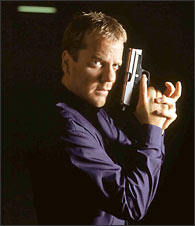We may be witnessing something truly remarkable in Iraq:
OK, the New York Times is writing about it on the front page ... do we dare talk about it now? The possibility of non-defeat?
The Iraq War is a curious thing. It may very well end up being the first war where opponents of it get to paint it as a defeat, and the proponents get to declare victory, with no one being able to conclusively prove the other wrong.

Nevertheless, as the NYT shows, even some longtime opponents of the war are just about ready to admit that things might be ever-so-slightly improving for Iraqis...
Is this permanent? Who knows. Is it reassuring? Definitely.
Does it jibe with what the Michaels (Totten and Yon) have been saying for weeks? Yes it does:
Here is some absolutely riveting writing from Michael J. Totten on the Anbar Awakening:
One night,” Lieutenant Markham said, “after several young people were beheadedAnother missive from Iraq, one that dares give us hope that Iraqis can overcome their deep sectarian rifts: Muslims go to church
by Al Qaeda, the mosques in the city went crazy. The imams screamed jihad
from the loudspeakers. We went to the roof of the outpost and braced for a
major assault. Our interpreter joined us. Hold on, he said. They aren’t screaming
jihad against us. They are screaming jihad against the insurgents."
“A massive anti-Al Qaeda convulsion ripped through the city,” said Captain McGee.
“The locals rose up and began killing the terrorists on their own. They reached the tipping point where they just could not take any more. They told us where the weapon caches were. They pointed out IEDs under the road.”
Then, on the other hand, there is Afghanistan:
The Senlis Council just released a sobering report, entitled Stumbling Into Chaos: Afghanistan On the Brink, which reminded me of something shocking Michael Yon posted on his site a few weeks ago.
I am far from a defeatist, but I must say that I am profoundly troubled. In the last year, the situation has deteriorated to the point that NATO is heading for a failure in its first major test as an organization. The implications of this are staggering, and we should not fool ourselves: A defeat in Afghanistan would be a fatal blow to the organization's credibility, and the dissolution of NATO thereafter would be likely. If NATO goes, what happens to Afghanistan? What happens to Canadian defence policy, for that matter?
So, given all of these developments, what will U.S. foreign policy be like in a post-Bush world?
Does the end of the Bush administration mean the end of empire? Not yet, says Macleans.
From the lips of Hilary Clinton:
"There is a refrain that we should intervene with force only when we face splendid little wars that we surely can win, preferably by overwhelming force in
a relatively short period of time. To those who believe we should become
involved only if it is easy to do, I think we have to say that America has never
and should not shy away from the hard task if it is the right one."
Looks like the next few years offer little in the way of certainty or reassuring platitudes from the heir-presumptive to the presidency.
Bonus heart-rending content:
A poignant remembrance of those who have fought and fallen there:
Last Letters from Kandahar
All my life I bugged my parents about when I could have a brother, and here I have all the brothers I could want.
Plus: Christopher Hitchens deals with a death
Instead of wasting your time going to see that Robert Redford flick, just read this. Trust me.

